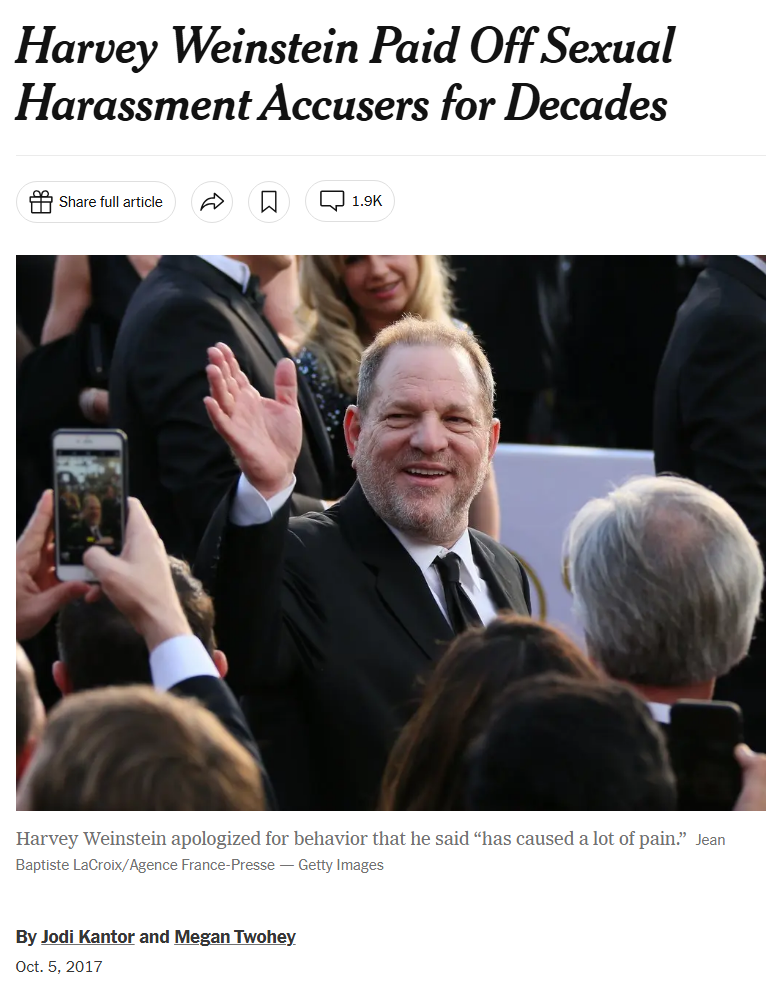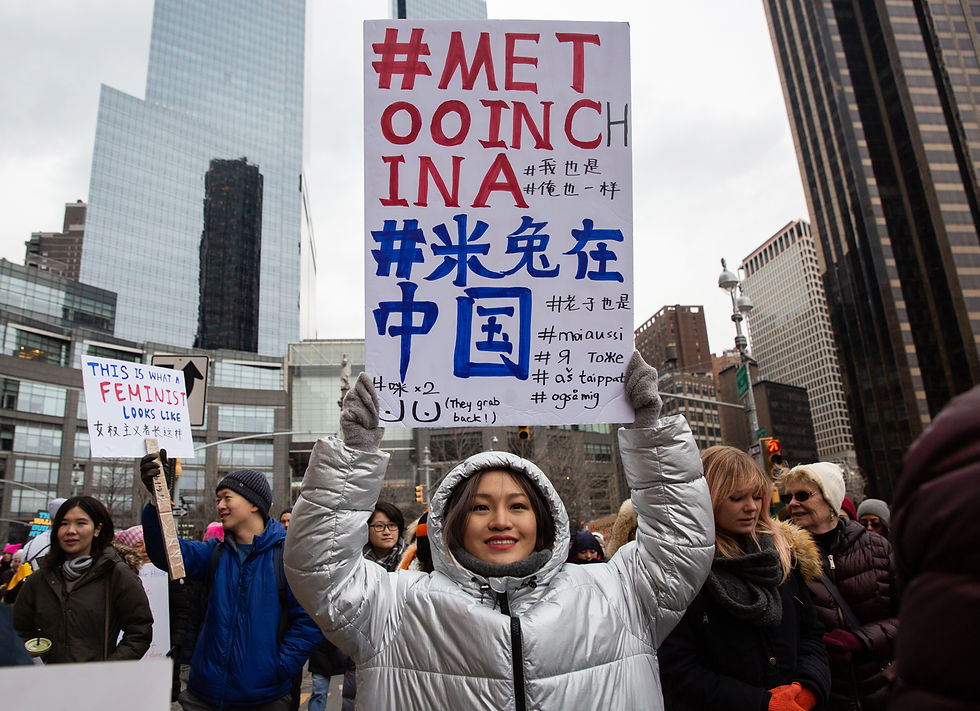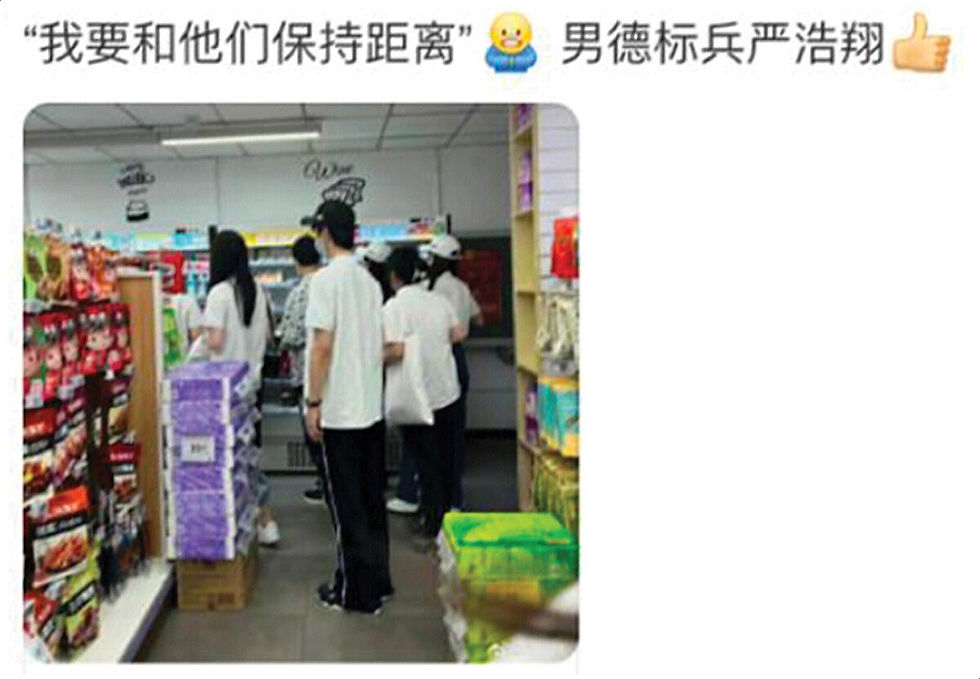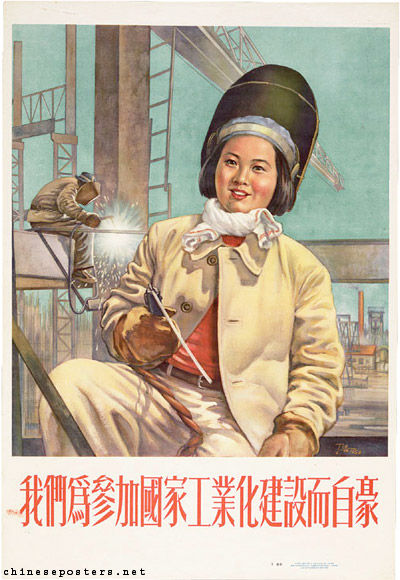#MeToo & #MituInChina
- Grace G.
- Apr 30
- 3 min read
The #MeToo movement is an international campaign against sexual abuse and harassment. It was first used around 2006, but it really gained momentum in 2017 following the Harvey Weinstein allegations. The idea is that you share your own story of experiencing sexual abuse and harassment, showing that you too are a victim and other victims are not alone. The hope is that it spreads awareness of the problem and how common it is, that you may not have known but many of the women you know have likely gone through something similar. With China specifically, it offers a case study of why Chinese feminism and activism is fundamentally different than other countries, like the United States.

The #MeToo movement first showed up in China on January 1, 2018 ("米兔"). Luo Xixi, a former postgraduate student at Beihang University in Beijing, posted on Weibo detailing how her former Ph.D. advisor sexually harassed her and other female students. It went viral, getting millions of views. However, the Sina Weibo authorities soon cleared it out. Any #MeToo discussions were banned on Weibo on January 17. It's not necessarily that this was Weibo or China taking a stance on sexual harassment, but rather a clear example of how social order is prioritized over all else. This movement is disruptive because it's calling out people in high places; it's challenging the traditional hierarchies and cultural norms. Accusations included those in the CCP, so it was in the government's best interest to bury it.
However, censorship is nothing new and feminists have become creative in their ways of circumventing it. In this case, they used a homophone to replace the buzzword #MeToo with 米兔 mitu, which directly translates to "rice bunny". A young feminist, Qiqi, created the hashtag #MituInChina or #米兔 so that the hashtag activism could resume on Weibo, just under a different name. A few prominent Weibo and WeChat accounts got involved, like the Feminist Voice and Women Awakening, to facilitate discussion and call for offline action. They also served as archives, collectivizing the movement to some extent. The digital activism even extended offline, with #MituInChina being seen in women's marches internationally (Hou 2020).


Another unique aspect of Chinese feminism is that it is often criticized for being a Western ideology. New thoughts on sexual harassment and domestic violence came from the 1995 UN Conference held in Beijing, so subsequent movements are easily labeled not or even anti-Chinese. Feminism also tends to go against the traditional and conservative ideas of the roles of men and women that have dominated Chinese society for ages, so there is a cultural resistance to making change. The same witty homophone used to adapt MeToo into Mitu has also been used by misogynists. For example, the word for feminism, 女权 nvquan, has been turned into 女拳 (also nvquan), which means "fist comes from a woman" to mock feminists for being overly aggressive. The wordplay and use of internet buzzwords is something that makes digital activism hard to take seriously for some. It also makes it difficult for the users posting under #MeToo or #MituInChina because of how easy it is to receive hate and backlash. The ability to reach a wide audience comes with the burden of who that audience can include.
Another criticism of both #MeToo and #MituInChina was that the universality of it actually limited its diversity. The #MeToo movement, founded by a black woman, only went viral from a privileged white woman's story. Feminist discourse generally has been influenced by more privileged backgrounds, since those are the women that can engage in activism without as many concerns. It's important that feminism be intersectional and acknowledge and address the differing levels of oppression women face. However, it's easy for digital activism to ignore that in favor of a universal message. Therefore, any digital activism should not be taken at face value; it should be critically examined in the greater context to see if it is actually pursuing change or if it is just generating views.
References
Chen, Chen, and Xiaobo Wang. “Contemporary Chinese Feminist Activist Rhetorics:
#MeToo in China.” Enculturation, 17 Feb. 2022, enculturation.net/contemporary_chinese_feminist.
Hou, Lixian. “Rewriting ‘the personal is political’: Young Women’s Digital Activism and new
feminist politics in China.” Inter-Asia Cultural Studies, vol. 21, no. 3, 2020, pp. 337–355, https://doi.org/10.1080/14649373.2020.1796352.
Kantor, Jodi, and Megan Twohey. “Harvey Weinstein Paid Off Sexual Harassment Accusers
for Decades.” The New York Times, The New York Times, 5 Oct. 2017, www.nytimes.com/2017/10/05/us/harvey-weinstein-harassment-allegations.html.
Lu, Shen. “Thwarted at Home, Can China’s Feminists Rebuild a Movement Abroad?”
ChinaFile, 28 Aug. 2019, www.chinafile.com/reporting-opinion/postcard/thwarted-home-can-chinas-feminists-rebuild-movement-abroad.
“米兔.” China Digital Space, chinadigitaltimes.net/space/%E7%B1%B3%E5%85%94.



Comments